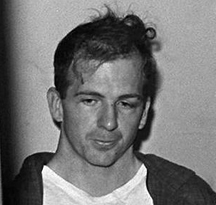(Reuters) – Lee Harvey Oswald had closer ties to Cuba’s intelligence agency in the months before his fatal shooting of John F. Kennedy than previously known, according to a new book by a former CIA analyst.

Furthermore, the CIA lied about its knowledge of those ties to the Warren Commission that was tasked with investigating the crime, according to Brian Latell, the CIA’s national intelligence officer for Latin America from 1990 to 1994 and author of the book “Castro’s Secrets: Cuban Intelligence, the CIA, & the Assassination of John F. Kennedy,” due out on July 9.
Cuba also hid what it knew about Oswald, writes Latell, citing a CIA wiretap of a conversation between two Cuban secret service agents he uncovered in declassified archives.
“I am now convinced that Oswald was engaged with the Cubans,” Latell told Reuters.
While he is careful not to suggest Oswald killed Kennedy on instructions from Havana, Latell says the new evidence confirms a widely held belief that Oswald was motivated to kill Kennedy by a fervent desire to impress Cuban leader Fidel Castro.
“I’m convinced he wanted to defect to Cuba,” Latell said. “He loved Cuba and Castro, and wanted to join the revolution.”
Latell’s book, which is a revised edition of an earlier work on Cuban intelligence published last year, is based on new pieces to the puzzle uncovered from several sources, including the unpublished memoirs of Thomas Mann, the U.S. ambassador to Mexico at the time of the assassination, as well as an interview with a former Cuban intelligence agent and declassified government documents.
Seven weeks before Kennedy’s assassination on Nov. 22, 1963, Oswald famously traveled to Mexico City by bus hoping to obtain a visa from the Cuban embassy there to visit Havana. Cuba denied him a visa, but the bus trip, and Oswald’s known communist sympathies, have long generated suspicion of Cuban involvement in Kennedy’s death, although no hard evidence has ever been found.
“What he did during most of the time he spent in the Mexican capital remains perhaps the most important unsolved mystery of the Kennedy assassination,” writes Latell, who spent much of his career at the CIA working on Cuba.
U.S. officials never admitted the full extent of what they knew, fearing perhaps they would face public pressure to retaliate against Cuba if greater evidence of a Cuban link became known, Latell argues.
Mann learned shortly after Kennedy’s death that Oswald had stayed at the Hotel del Comercio in Mexico City, known by the CIA to be a haven for Cuban spies in Mexico working for the DGI, Havana’s national intelligence agency, closely run by Castro.





